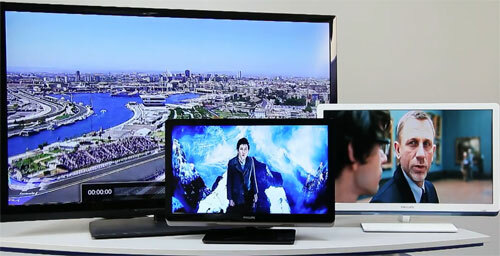In the super- and hypermarkets of consumer electronics, the buyer who wants to buy a TV, first of all, must decide which technology to prefer: plasma or liquid crystal( LCD technology).Making the right choice directly in the store is not always possible, because many advantages and disadvantages of both technologies are initially not obvious. In this article we will tell you how differs from the plasma.

Power Consumption
The power consumption of the "plasma" is several times higher than the LCD TV.This difference is technologically conditioned: at the time of the construction of the "picture" the cell of the plasma display operates under a voltage of 200-300 V, and the LCD display is 5-12 V. For the illumination of each logical element of the "plasma", energy is required, and its volume depends directly on the brightnessthe glow of its glow. Due to the limited power of the PSU( power supply unit), this effect can be observed: when a particularly bright area appears on the display, the intensity of the illumination of other areas falls.
The LCD screen is illuminated by the lamps installed behind it, the light of which falls uniformly on each element and is transformed by them separately. In this case, the least amount of electricity is spent on changing its state.
Resolution
The elements of the plasma display are larger than the LCD, and the distance between them is larger. This is due to the advantage of LCD TVs in resolution.42-inch "plasma" has:
- 860 pixels - horizontally;
- 420 - vertically.

The resolution of the LCD screen with the same diagonal is 1280x768 pixels.
Contrast
In this criterion, unconditional leadership belongs to plasma technology. If the LCD panel has a contrast ratio of 500: 1, then for plasma in the order of things the indicator is 2000: 1, and in the most recent models - 4000: 1.
From here follows one more difference of the plasma TV from liquid crystal: the latter displays black color less saturated and deep. This circumstance may not seem very important, but on perception of the "picture" it is very noticeable.
Angle of View
Another parameter by which LCD panels have not yet managed to outdo plasma TVs. The viewing angle for liquid crystal displays hardly reaches 170 degrees. But the "plasma" picture can be seen from almost any point.

The difference between LCD and "plasma" is also that viewing the image on the latter remains comfortable at any viewing angle, whereas the picture on the LCD panel when the viewpoint is turned to the right or to the left from the axis perpendicular to the screen noticeably fades.
Lifespan
Serves devices, both liquid crystal and plasma, almost the same: tens of thousands of hours. In other words, such a TV can last for more than ten years without repair, even if it works daily for 8-10 hours. The image on both types of TVs will become less bright as the operating time increases; only this happens in different ways, and this is the difference between the LCD and the plasma:
- brightness decreases steadily on the LCD screens, that is, in equal parts over a certain period of time;
- the brightness of the "plasma" decreases to a greater extent during the first years of operation, and then - more smoothly and almost imperceptibly. True, there is one nuance: the service life of the "plasma" display depends on the mode of operation. On its surface is a layer of phosphor( phosphorus), which eventually burns out, so that the broken pixels can appear on the screen. This phenomenon can be observed with frequent viewing of teletext, for example.
Price
It remains a few words to say about the price. Here the following picture is observed: the more "plasma", the lower its price. Conversely, a device that runs on liquid crystals is the cheaper, the smaller its dimensions. This difference between the LCD and the plasma is explained simply: the cost of the plasma is inversely proportional, and the cost of the LCD is directly proportional to the diagonal of the product.
As you can see, the LCD TV differs from the plasma TV quite noticeable, and before buying a TV there is something to think about. We hope that this article will save you from annoying mistakes when choosing a TV, and your purchase will please you with a long smooth operation.



